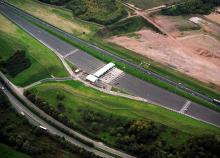Foreign road users could be paying up to €130 (US$147) a year for using Germany's autobahn motorways starting in 2016.
The plan was given the go-ahead by the German government last October but implementation could be delayed if it faces a legal challenge by European member states.
Bavarian state transport minister Alexander Dobrindt said he was convinced that the draft law does not discriminate against foreign motorists, an issue if the law were to be challenged in any European court. He called the infras
RSSForeign road users could be paying up to €130 (US$147) a year for using Germany's autobahn motorways starting in 2016.
The plan was given the go-ahead by the German government last October but implementation could be delayed if it faces a legal challenge by European member states.
Bavarian state transport minister Alexander Dobrindt said he was convinced that the draft law does not discriminate against foreign motorists, an issue if the law were to be challenged in any European court. He called the infrastructure fee “sensible, fair and just". Toll fees would be used only for maintaining Germany's major roads.
Motorists would register their car registration numbers plates on the internet. Foreigners could also pay the levy at petrol stations. Fees payable up to the maximum €130 would be based on the car’s cylinder capacity and environmental credentials.
Foreign drivers would pay €10 for 10 days’ use or €22 for a month of driving. The government estimated an intake of around €3.7 billion, of which €3 billion would be from German nationals.
Implementation of the plan could cost up to €200 million and, after drivers change their habits, revenue might fall to around €500 million a year.
Germany has a satellite-based toll system for truck drivers using motorways where they pay per kilometre.
The plan was given the go-ahead by the German government last October but implementation could be delayed if it faces a legal challenge by European member states.
Bavarian state transport minister Alexander Dobrindt said he was convinced that the draft law does not discriminate against foreign motorists, an issue if the law were to be challenged in any European court. He called the infrastructure fee “sensible, fair and just". Toll fees would be used only for maintaining Germany's major roads.
Motorists would register their car registration numbers plates on the internet. Foreigners could also pay the levy at petrol stations. Fees payable up to the maximum €130 would be based on the car’s cylinder capacity and environmental credentials.
Foreign drivers would pay €10 for 10 days’ use or €22 for a month of driving. The government estimated an intake of around €3.7 billion, of which €3 billion would be from German nationals.
Implementation of the plan could cost up to €200 million and, after drivers change their habits, revenue might fall to around €500 million a year.
Germany has a satellite-based toll system for truck drivers using motorways where they pay per kilometre.






